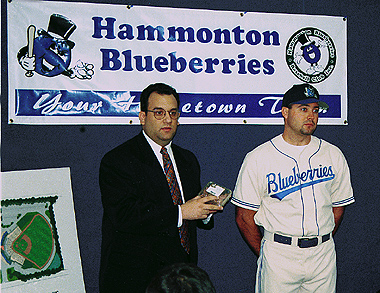![]()
Departments
![]()

|
13 August 1999 |
Vol. III, No. 3 |
Feature Article
Blueberry Field forever
Alum hopes to bring minor league baseball to his hometown
By Brian Fitzgerald
If all goes according to plan, a BU alumnus' field of dreams will soon be a field of grass. Gabriel Donio (CAS'95) is president of the Hammonton Blueberries, a minor league baseball team that has yet to play a game, sign a player, or have a ballpark to call home.
But this will change in the near future, says Donio, because he received some good news on August 4: the board of directors for the Northern League, the nation's largest independent baseball league, voted to start a six-team developmental division that would include southern New Jersey's Blueberries. "I'm ecstatic," says Donio. "We've pretty much done the impossible. We started with nothing and wound up having a great shot at having a minor league team in Hammonton."
Donio hopes to secure building permits and begin construction on the 3,500-seat facility in his hometown this fall -- and see his team play ball in the 2001 season. Private financing for the $6 million baseball park, which will be "a rough miniature of the Brooklyn Dodgers' Ebbets Field," says Donio, was made possible by "a group of businesspeople committed to the community," including owners of a local paving company and Hammonton's Atlantic Blueberry Company, which has the largest cultivated blueberry farm (1,300 acres) in the world.
The Blueberries were incorporated in January 1997 and within a month Donio had the team uniforms and stadium design prepared for a press conference. That November the Blueberries bought a 220-acre tract of land for $200,000. But starting a minor league franchise is a precarious enterprise, and the Berries are not yet an overnight success story. Independent league teams have no major league baseball parent teams and are lower in the baseball pecking order than minor league AAA, AA, and A affiliates. The nearest big-league team, the Philadelphia Phillies, already has farm teams in Scranton, Wilkes-Barre, and Reading. After discussions with the independent Atlantic League last fall, Donio considered purchasing and relocating an existing franchise in the Northern League, but the two sides couldn't agree to terms.
|
|
|
Gabriel Donio (CAS'95) (left) owner of the Hammonton Blueberries baseball club, shows the public plans of the team's new ballpark. With Donio is ex-New York Yankees farmhand Scott Gully, who diplays the Blueberries uniform. Donio holds a box of blueberries, which his team may use for promotions. |
"The Hammonton Blueberries have shown us that they are committed to building a ballpark and fielding a team," says Northern League East Division Executive Director Mike McGuire. "They have strong community support."
Donio says that his experience at Boston University has everything to do with his accomplishment so far. "I had a great liberal arts education at BU," says Donio, who majored in English, wrote a sports column for the Daily Free Press, and worked in a souvenir store across from Fenway Park. "I learned how to deal with people, which in business is the most important skill you can have."
After graduating, he attended graduate school at Georgetown University and worked on Capitol Hill for New Jersey Republican Congressman Frank LoBiondo. As a congressional aide he saw how North Wildwood, N.J., started a minor league franchise by courting business leaders, touting the team as an economic benefit to the town.
"In Hammonton, there isn't much to do at night," says Donio. "We'll be providing affordable family entertainment. In Veterans Stadium in Philadelphia, the average ticket costs $16 to $20, and a $10 ticket puts you up in the nosebleed seats."
Plus, he adds, Hammonton is a relatively affluent town. Although minor league baseball traditionally has a gritty, blue-collar identity, Donio says that the upscale community is likely to consistently fill the ballpark and spend money on concessions and souvenirs. Many minor league organizations tend to pull up stakes and move a lot, but Donio says that independent leagues are slowly shaking their fly-by-night stigma. At present, minor league baseball's popularity is surging, and movies such as Bull Durham have helped publicize the quaintness of the small ballpark experience. Where else can a fan establish eye contact with a player, say hi, and have the player return his greeting as he's walking off the field?
"Our payroll will be $50,000 to $75,000 for a 25-man roster," says Donio. Indeed, in these days of absurdly high player salaries in the major leagues, along with their share of whining prima donnas, much of minor league baseball's appeal is its innocence. The Blueberries will wear throwback uniforms, and the ushers will don 1950s outfits.
"We're elated at the prospect of having professional baseball in Hammonton," says town councilman James Bertino. "It creates jobs and will be a big opportunity to the industrial park area. How many other towns would love to have their own ballpark, and have it built without taxpayer money? It's a win-win situation for the town of Hammonton."
